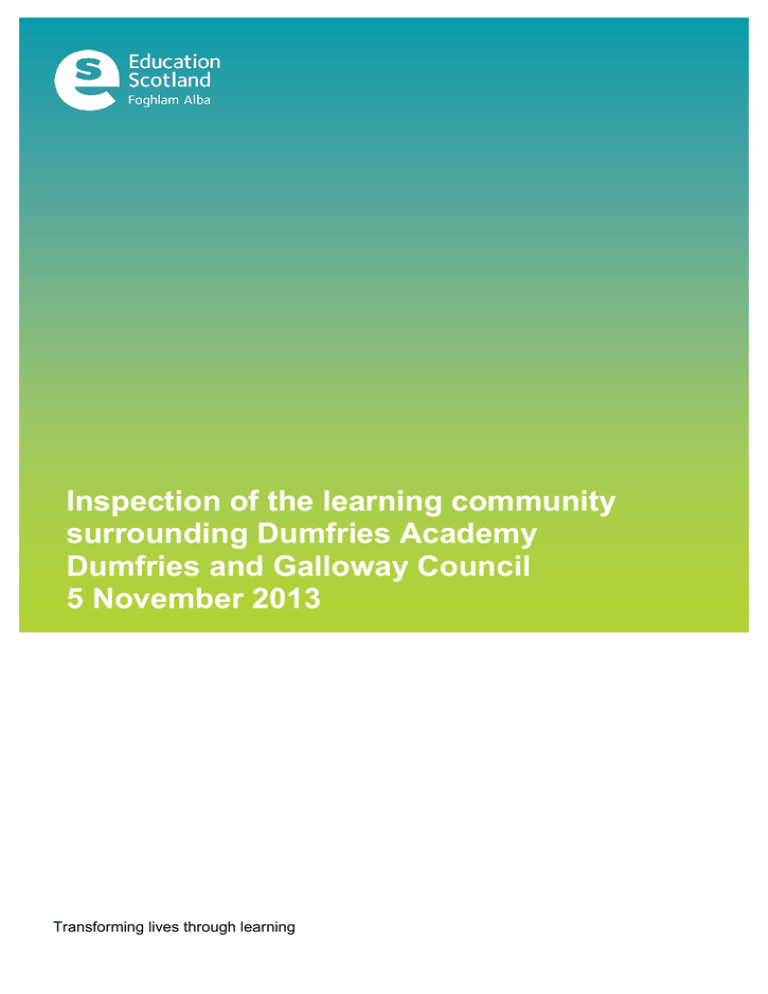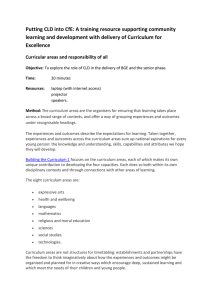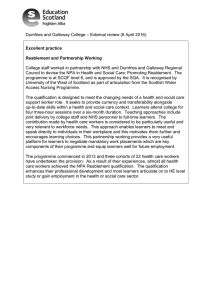Inspection of the learning community surrounding Dumfries Academy Dumfries and Galloway Council
advertisement

Inspection of the learning community surrounding Dumfries Academy Dumfries and Galloway Council 5 November 2013 Transforming lives through learning 1. Context Community learning and development (CLD) partners within the area of Dumfries Academy were inspected by Education Scotland during September 2013. During the visit Education Scotland staff talked to children, young people and adults. We worked closely with local CLD managers, CLD providers, partners, paid staff and volunteers. We wanted to find out how well partners are improving the life chances of people living in the community through learning, building stronger more resilient communities and improving the quality of services and provision. We also looked at how well, paid staff and volunteers are developing their own practices and how well partners, including schools are working together. 2. How well are partners improving learning, increasing life chances, promoting and securing wellbeing? Partners work very well together to increase life chances and promote and secure wellbeing. Young people achieve very well through a wide range of programmes. Increasing numbers of young people are participating in programmes and are involved in youth forums and councils. High numbers of young people from Dumfries Academy progress to further and higher education. Those going into employment, although lower than previous years, remains higher than the national average. Youth Beatz, an annual music event attracts around 12,000 young people each year. Police statistics show significant decreases in anti-social behaviour during the event. There are also marked increases in economic impacts and visitor numbers in Dumfries as a result. Partners target priority groups well. Youth workers target marginalised young people and are significantly increasing life chances through learning. Innovative and high quality programmes very successfully engage young people with disabilities, ex-offenders, unemployed and those on low incomes in learning. Operation Resolve has successfully reduced alcohol abuse and anti-social behaviour. Learning programmes for young people and adults are of high quality. Adult learning staff use needs assessments well to plan and target provision. Targets set for adult learning and English for speakers of other languages are being exceeded. Most learners are progressing to employment, voluntary work and further learning. Good opportunities exist for young people and adult learners to gain accreditation. However, completion rates could be improved in some instances. New community groups supported by partners have almost doubled in the past year and volunteering is increasing. Partners deliver high quality, relevant programmes that make significant impacts on the lives of young people and adults. Young parents in the Bouncin’ Bairns group now have a greater sense of wellbeing. Children with additional support needs progressing from primary to secondary school benefit from good transition arrangements. Youth workers support young people very well to increase life chances. Many individual young people are now better able to make positive changes to their lives. Members of the Super Mondays group for young people with additional needs demonstrate increased self-esteem and reduced social isolation. The Nithsdale Challenge, a diversionary programme is helping young people become less socially isolated, communicate more effectively and work better in a 1 team. Many young people across the learning community are gaining accreditation through the Duke of Edinburgh’s Award, Saltire Awards, Dynamic Youth Awards and Youth Achievement Awards. Many are now using these to progress to other learning and employment. Twenty active young leaders at the Oasis Youth Centre make a marked contribution to their community through volunteering. High quality innovative programmes such as the Youth Beatz and World of Wonka events help young people develop skills and address issues that affect their lives. A degree of challenge is helping to stretch young people to make important choices, for example working in a soup kitchen in Washington DC. Members of the Global Education Group are improving literacy and numeracy and exploring global and local issues. Adults achieve very well through a range of high quality learning programmes. Literacy learners are gaining qualifications that are contributing to a better life for their families. The North West Resource Centre supports individuals very well to progress to further learning. Participants in computing classes have overcome isolation and improved their sense of wellbeing. Almost all adult learners have overcome barriers to learning through quality programmes such as the Hampden Quilting Project and Start with Art. Adults, with long term health conditions are well supported by Building Healthy Communities to improve their lives. Participants in Employability and Skills Workshops are now more confident at interviews and can budget better. Offenders at Dumfries Prison are gaining important skills for life. Clearer identification of learner pathways would enhance adult learning further. A few learners could be more aware of their choices for progressing to the next stage of learning. A very wide range of community groups are significantly improving life chances and wellbeing across Dumfries. Staff and volunteers working in Summerhill Community Centre are positively changing their local community through responding to local needs. New sporting facilities are now attracting over 200 people. Friends of Dock Park perform an important role in improving a neglected facility and are increasing the value of investment coming into the community. Employment opportunities are increasing and helping to improve life chances. Volunteers at Georgetown Community Centre are well supported by the Hub (Nithsdale Council of Voluntary Service) to run their facility effectively. They are increasing local employment and supporting volunteers through the establishment of a Community Investment Company. Increasing funding is coming into the Dumfries economy through the efforts of Community Councils and local groups. Upgrading community sports facilities is encouraging more participation in sports and increasing wellbeing. Trustees at Moat Brae attract significant levels of funding and The Stove Network contribute to town centre regeneration. The People’s Project is making an important contribution to community life. They help to raise awareness of community issues and lead campaigns including reducing litter. Across the learning community there is a strong picture of sustainability. There is a strong culture of people working together to help improve life chances through well run community projects and volunteering. Community action is highly visible. However, there is a lack of clarity across partners regarding the role and function of the Community Planning Partnership and how existing forums can contribute to strategic planning. 2 3. How well are partners working together and improving the quality of services and provision? Partners work effectively across the learning community. Strong informal networks ensure that information is shared well across partners and learners are signposted appropriately. The Dumfries and Galloway Employability Partnership has developed a strategic employability pipeline that collates partners’ contributions. This is helping partners to share information and reduce duplication. Good partnership working with Dumfries and Galloway College staff in Dumfries Prison is leading to prison officers being up-skilled to deliver courses to prisoners. Comprehensive needs analysis carried out by CLD staff is helping partners to plan and develop services better. The Nithsdale Youth Work Practitioners Forum promotes and shares information. This could be further extended to include the planning and delivery of joint programmes. Sharing of data to inform joint planning in adult learning could also be improved as could joint self-evaluation across partners. There is a lack of understanding regarding the relationship between The Hub and Third Sector First which could lead to duplication. CLD staff and volunteers are well supported through extensive and good quality professional learning opportunities. Staff are motivated and feel valued. They are actively encouraged to improve their practice and a few are gaining qualifications as a result. All CLD staff benefit from annual professional review and development and regular support and supervision. CLD managers support and challenge staff effectively. A programme of quality assurance visits is helping to raise standards in working with young people. CLD staff plan their work well. A consistent and well understood system of planning using the LEAP (Learning Evaluation and Planning) framework is improving practice. Self-evaluation is well understood and used to improve provision. All youth work planning reflects the experiences and outcomes from Curriculum for Excellence. Partners are using a good range of methods to report to stakeholders. Youth Beatz provides well presented accounts of the outcomes from the events. Materials are of high quality. Dumfries and Galloway College report well on outcomes from joint programmes. There is scope to work better with staff at Dumfries Academy to undertake joint planning and training around Curriculum for Excellence. This inspection of learning and development in the learning community surrounding Dumfries Academy found the following key strengths. Learners who are achieving, attaining and improving their life chances. Very strong outcomes for young people through innovative and creative learning programmes. Strong, resilient and active community organisations. Highly motivated and skilled staff delivering high quality programmes for learners. Strong partnerships which are leading to positive changes in the community. 3 We discussed with partners how they might continue to improve their work. This is what we agreed with them. Greater focus on joint self-evaluation and planning across partners. Clarification of the arrangements for third sector engagement across the learning community. Improved planning with staff at Dumfries Academy to undertake joint planning and training around Curriculum for Excellence. 4. What happens at the end of the inspection? We are satisfied with the overall quality of provision. We are confident that the learning community’s self-evaluation processes are leading to improvements. As a result, we will make no further evaluative visits in connection with this inspection. During the inspection, we identified aspects of innovative practice which we would like to explore further. As a result we will work with the learning community and education authority in order to record and share more widely the innovative practice. Sheila Brown HM Inspector 5 November 2013 4 Additional inspection evidence, such as details of the quality indicator evaluations, for this learning community can be found on the Education Scotland website at http://www.educationscotland.gov.uk/inspectionandreview/reports/othersectors/com munitylearninganddevelopment/DumfriesAcademyLCDumGal.asp If you would like to receive this report in a different format, for example, in a translation you can contact the administration team on 01506 600381. If you want to give us feedback or make a complaint about our work, please contact us by telephone on 0141 282 5000, or e-mail: complaints@educationscotland.gsi.gov.uk or write to us, addressing your letter to The Complaints Manager, Denholm House, Almondvale Business Park, Livingston, EH54 6GA. Text phone users can contact us on 01506 600 236. This is a service for deaf users. Please do not use this number for voice calls as the line will not connect you to a member of staff. Crown Copyright 2013. Education Scotland 5




